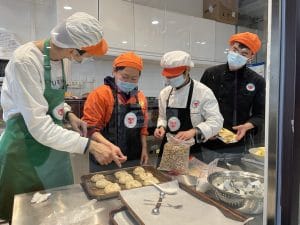According to data from the Beijing Society of Audiology (BSA), there were an estimated 720 million people with a hearing impairment in China in 2017. Among them, about 500,000 were children, 115 million were young and middle-aged adults, and the rest were elderly. The data includes those who lost their hearing due to medical accidents or injuries, as well as people who were born deaf. Sadly, data from BSA also shows that only five percent of deaf and hard-of hearing people have access to hearing aids, and even less are able to undergo cochlear implant surgery.
Loss of hearing can cause a person various challenges in life, including when finding employment. Although the government has made it mandatory for large companies to hire 1.5 disabled people for every 100 employees, in reality, businesses often register disabled people as their employees without offering them any real job. But charities are trying to offer a better future to those left out of the labor market.
China Development Brief recently talked to Felicia Lee, founder of a café called Rainbow Angel Coffee (R. A. Coffee) whose full-time staff are all people with hearing impairments. She shared her concept of giving the deaf a marketable skill – baking, enabling them to work and support themselves.

Lee was born and grew up in Taiwan. She and her family moved to Beijing for work in 2011. With two young daughters aged one and four, Lee struggled to find suitable nurseries for them, so she decided to become a full-time mother and spend as much time with her daughters as possible. It was during the family’s fifth year in Beijing that a visit to a rehabilitation center for deaf children changed all their lives.
“My elder daughter’s school asked students to ‘do a good deed’ for Lei Feng Day,” said Lee, “and I came up with the idea of performing a musical at places such as a children’s welfare house.” In the end, she and a group of children visited a deaf children’s rehabilitation center close to her home.
This experience of doing something good left Lee with food for thought. “I would not say our visit to the rehabilitation center was very successful,” she said, “because although we had good intentions, we did all the things based on our own plans; we did not consider the needs of the deaf children at all.”
Immediately after the musical started, Lee realized that the children could not hear anything that was being performed. But to her great surprise, everyone in the audience was watching attentively, and some were even shedding tears. “It was amazing that they understood the performance without hearing the lyrics. This made me really eager to get to know the deaf children more.”
As she began to research deaf children in China, Lee built up more contacts and got to know people’s stories. “Some of the parents, once their child was diagnosed with a hearing impairment, would first buy them hearing aids, and then send them to rehabilitation centers. If they were from a small town or a rural area, the parents would often send their children to bigger cities where they might receive better treatment, therapy and later more opportunities to find jobs or receive help from charities.”
According to Lee, the fees for rehabilitation centers in cities like Beijing can become a burden to many families, so normally, both parents will have to work in order to afford their child’s care. If a child is able to get hearing aids and receive treatment at an early age, there is a high chance that they will learn to speak and eventually lead a normal life. But not all children are that lucky.
“There are parents who are not aware that there are hearing aids and rehabilitation centers, or they do not have access to these services. Once they realize these services exist, it has long passed the best time for their children to get suitable hearing aids and receive treatment. And it is then very difficult for children to get used to hearing sounds and learn how to speak.” Yet often out of guilt, parents will still choose to send their children to rehabilitation centers even if it will make little difference to their lives.
There is also another path open to deaf children according to Lee: attending specialist schools for the deaf. Nowadays, these schools are run by the government, meaning that the fees will be much lower than private rehabilitation centers. The path that deaf children’s schools take is different from that of rehabilitation centers; the latter offer children therapy and teach them to speak, and the former only focus on teaching children standard Chinese (Mandarin) sign language (CSL)[1] while following the national curriculum. Special needs education gives deaf children a relatively higher level of education, yet to a great extent prevents them from ever listening to sounds or being able to speak.
Understanding the difficulties faced by deaf children prompted Lee to do something about it. She was determined to offer them some kind of skill that could be used to make a living. “I wanted to find a skill that was not complicated, relevant to their daily life and also needed by the labor market,” she said. In the end she chose baking, establishing R. A. Coffee in 2017. The café aims to give people with hearing impairments hope and more confidence in themselves. The first batch of apprentices were people who had left rehabilitation centers and wanted to find work.

Coming from a financial background, Lee had to learn how to bake from scratch. After failing to find a baking class to enrol in, she began to seek help from friends back in Taiwan, who suggested various videos to learn from. “I learnt by following the videos and trying to memorize the most basic and important steps for teaching our apprentices,” she told CDB. While able-bodied people might start learning how to bake by following oral or written instructions, Lee began by getting her deaf apprentices to taste the food. “The students can be very sensitive and timid, so showing them the baked food and letting them have a taste is a good way to get them interested.”
But getting the apprentices to start doing any baking proved to be far from plain sailing. On the first day, they were reluctant to get close to the work surfaces and touch any ingredients. Many simply stood around and looked shyly at Lee. But her daughter, who was four years old at the time, joined the group and started pressing the dough using a rolling pin. This simple act seemed to encourage the group. “When they saw that a child could do it, they became bolder.”
Lee’s two daughters have been great supporters of her work, helping her get people trained and socializing with everyone in the café. “My daughters regard our staff and apprentices as their friends and family,” she said.
Looking back, Lee would admit that during the initial stages, things were not done in a very professional manner. “I knew very little sign language when I started R.A. Coffee,” she said. Those who went to rehabilitation centers or special schools at a relatively young age were able to speak or recognize Chinese characters, and their communication with Lee was much easier. But others were not so fortunate and therefore could not speak or use sign language well, leading to misunderstandings. “Once we baked some desserts that required quite complicated procedures, and I did not manage to teach them all the steps properly; they turned out badly and this really upset our apprentices.”
But Lee was not disheartened. She decided to learn standard Chinese sign language and her first teacher was one of the deaf apprentices at the coffee shop who had attended a special school. Gradually, Lee became capable of simple conversations, although it is something she still finds hard. “Even now, I am learning new phrases from our staff every day.”
To read part two of CDB’s interview with Felicia Lee, click here.
[1] CSL is the standard Chinese sign language, however dialectical sign languages exist in each province.



